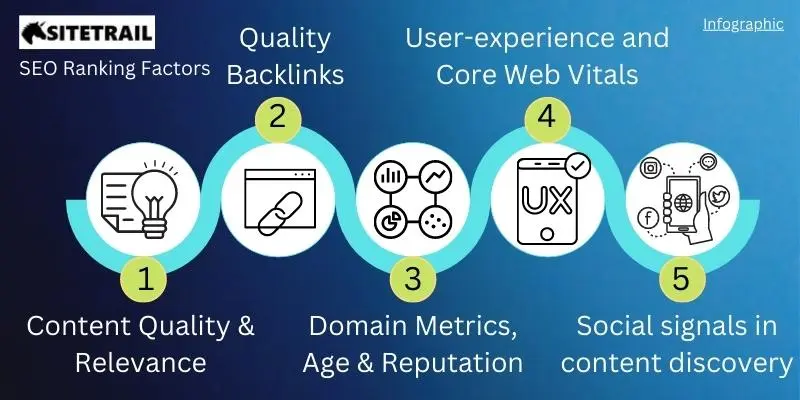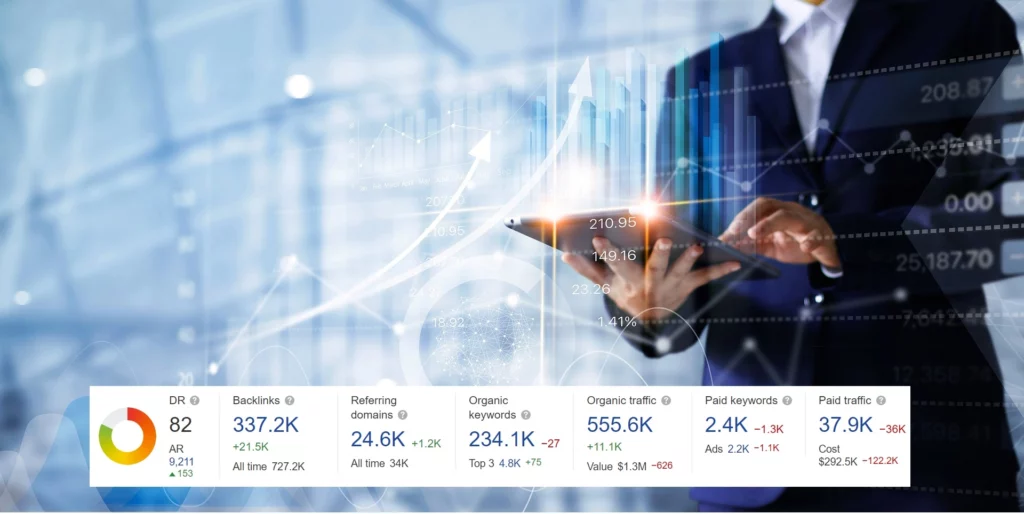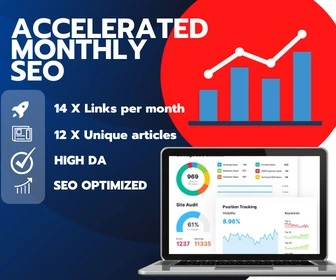Things changed a lot in SEO ranking factors. As a blogger, it’s very important to know the latest SEO ranking factors. In this article, we have compiled 10 of the most important SEO ranking factors and what they mean. You may have thought of Domain Authority and Page Authority, which rank how authoritative your site is – but these days, core web vitals may well be the most important.
Consider, for example all the latest SEO statistics gathered from around the world – then you’ll understand why those old ranking factors from the past are slightly less important now than they were before. You’ll also appreciate what to look out for right now. Yes, there are more than 100 ranking factors, so which ones should we focus on as the most important for our business?
SEO Ranking Factors Infographic
SEO Ranking factors – Download the PDF

What are Ranking Factors?
Ranking factors are the signals that search engines use to determine where a piece of content should rank on the search engine results page (SERP). There are over 200 ranking factors, but some are more important than others. The most important SEO ranking factors are:
1. Content quality and keyword optimization
2. Backlinks
3. Domain age, authority, and trustworthiness
4. User experience
5. Social signals
Ranking Factor #1: Keyword Optimization
The first and most important SEO ranking factor is keyword optimization. This means that your website should be optimized for the keywords that people are searching for when they are looking for products or services like yours. There are a number of ways to optimize your website for keywords, including using them in your titles, descriptions, and content.
When people search for keywords related to your business, you want your website to come up as one of the first results. This is because people are more likely to click on a result that is higher up on the page. To make sure that your website is optimized for keywords, you should use the best SEO tools like Google Ads Keyword Tools, The Keyword Planner, AHRefs, Moz Keyword Explorer etc. These tools will help you research which keywords are most popular and how difficult they are to rank for.
Once you have a list of keywords, you can start incorporating them into your website. Make sure to use them in a way that sounds natural and not forced. In addition, don’t stuff your keywords into your content – this will only make it harder to read and could get you penalized by Google. A good rule of thumb is to use each keyword 2-3% of the time in your content.
By optimizing your website for the right keywords, you’ll be able to improve your SEO ranking and attract more organic traffic to your site.
Ranking Factor #2: Domain Age
This was one of the most important ranking factors in SEO: domain age. It is less so today. This is because a domain that has been around for longer is more likely to be trusted by search engines. A new domain is going to take longer to build trust with search engines.
Domain age is also a factor in helping your website rank higher in search results. The longer your domain has been registered, the more likely it is that your website will be seen as credible and trustworthy. This can help your website rank higher in search engine results pages (SERPs).
If you’re starting a new website, don’t worry too much about domain age. You can still build trust with search engines by publishing high-quality content, building links, and making sure your website is mobile-friendly and easy to use.
Ranking Factor #3: HIGH QUALITY Backlinks
This unique link building service will ensure you get the type of links your competitors don’t have. Backlinks are one of the most important ranking factors in SEO. They are a major factor in how Google ranks websites. A backlink is a link from one website to another. Backlinks are also called inbound links or incoming links.
Google counts backlinks as votes for a website. The more backlinks a website has, the more popular it is. This is why backlinks are so important. They can increase a website’s popularity, and therefore its ranking on Google.
There are two types of backlinks: dofollow and nofollow. Dofollow backlinks are the most valuable because they pass along link juice, or authority, to the linked website. This helps the linked website rank higher on Google. Nofollow backlinks do not pass along link juice, but they can still be valuable because they show that other websites are linking to yours.
To get high-quality backlinks, you need to have a well-designed and informative website that other websites want to link to. You can also create great content that other websites will want to link to. Creating great content is one of the best ways to get high-quality backlinks.
Ranking Factor #4: Content Length
Note that Eric Mueller from Google asserted that some content is too long – and that writers should not waste the users’ time. In fact these were his precise comments: “Unrelated to your question, but interestingly the times I see “word count” mentioned internally at Google, it’s always about upper limits. Don’t waste people’s time, get to the point. Fluff + many words = a waste of the read’s complete time. Fluff + few words is at least quick.”
Therefore we’d say this: Don’t overdo the length of your articles, but certainly deliver worthwhile longform content with useful and diverse information.
With this in mind, content length is one of the most important ranking factors for SEO. The longer your content is, the more likely it is that people will find it relevant and useful. That’s because longer content usually contains more keywords and phrases that people are searching for. And, as a result, longer content tends to rank higher in search engine results pages (SERPs).
Of course, not all long-form content is created equal. To rank well, your content must be both informative and engaging. It should also be free of spelling and grammatical errors. So, while there’s no magic number for how long your content should be, aim for quality over quantity.
To sum up, here are the key takeaways when it comes to content length and SEO:
Longer content usually ranks higher in search engine results pages (SERPs).
To rank well, your content must be both informative and engaging.
Aim for quality over quantity when creating long-form content.
Ranking Factor #5: Social Media Presence
When it comes to social media presence, it’s not just about having a lot of followers. It’s also important to have an engaged audience that is regularly interacting with your posts. The more engagement your posts get, the more likely it is that your social media presence will positively impact your SEO ranking.
To increase engagement on your social media posts, make sure to post interesting and relevant content that encourages people to comment, like, and share. Also, be sure to respond to any comments or questions you receive in a timely manner. By creating a strong social media presence, you’ll not only improve your SEO ranking, but you’ll also build trust and credibility with potential customers.
Ranking Factor #6: Positive User Feedback
One of the most important ranking factors that you should be aware of is positive user feedback. This feedback can come in the form of reviews, comments, likes, and shares. It’s important to encourage your visitors to leave feedback on your site, as this will signal to search engines that your site is providing a good user experience.
A great way to get positive user feedback is to offer something in exchange for it, such as a discount or giveaway. You can also promote your social media channels on your website so that visitors can like and share your content. Make it easy for visitors to leave feedback by including prominently placed review forms and comment sections.
Ranking Factor #7: Negative User Feedback
If you’re not providing a good user experience, your SEO rankings will suffer. That’s why it’s important to keep an eye on negative user feedback and address it quickly.
Negative user feedback can come in many forms, including:
-Poor reviews
-Complaints on social media
-1-star ratings
Whatever the form, negative feedback is a sign that something is wrong with your website or business. It could be something as simple as a confusing navigation menu or a buggy checkout process. Or it could be something more serious, like poor customer service or shoddy products.
Whatever the issue, it’s important to take negative feedback seriously and work to address the problem. Ignoring it will only make things worse and could lead to a sharp decline in your SEO rankings.
Ranking Factor #8: Site Loading Speed
Site loading speed is a key ranking factor for SEO. A faster loading website will rank higher in search engine results pages (SERPs) than a slower site. This is because users are more likely to click on a link to a fast-loading site than a slow-loading site.
Search engines also take site loading speed into account when determining where to rank a website in SERPs. A faster loading site is more likely to be ranked higher than a slower site.
There are a few things you can do to improve your site’s loading speed, such as optimizing your images and using a content delivery network (CDN). You can also use Google’s PageSpeed Insights tool to get suggestions on how to improve your site’s loading speed.
Ranking Factor#9: Mobile Friendliness of Website
A website’s mobile friendliness is now a key ranking factor in Google’s search algorithm. This means that if your website is not optimized for mobile devices, it could be penalized with lower search engine rankings.
To make sure your website is optimized for mobile devices, you need to make sure it has a responsive design that automatically adjusts to fit the screen size of any device. You should also avoid using Flash content, as this is not supported on most mobile devices.
In addition to a responsive design, your website should also be easy to use on a mobile device. This means having a simple and user-friendly navigation menu that can be easily accessed on a small screen.
If you want to improve your website’s mobile friendliness, then these are some key factors you need to keep in mind.
There are many factors that contribute to a website’s SEO ranking, but some are more important than others. Here are the most important SEO ranking factors you should know:
1. Relevancy
The most important factor for determining a website’s SEO ranking is relevancy. This means that the content on your website must be relevant to the keywords that you are targeting. If your website is not relevant to the keywords that people are searching for, then it will not rank well in the search engines.
2. Keyword density
Another important factor for SEO is keyword density, which is the number of times a keyword appears on a page divided by the total number of words on the page. A higher keyword density indicates to the search engines that your page is relevant to the keyword and should rank higher for that term. However, beware of stuffing your pages with too many keywords as this can result in penalization from the search engines.
3. Title tags and meta tags
Title tags and meta tags are HTML elements that help define the contents of a web page. The title tag is the title of your page, while meta tags provide additional information about your page such as its description and keywords. Both title tags and meta tags are used by the search engines when determining a web page’s SEO ranking, so it’s important to make sure they’re optimized for your target keywords.
4. Page loading speed
The speed at which a web page loads is another important factor. Nowadays, core web vitals include this under a much broader umbrella of metrics.
Conclusion:
I would say that right now, user-experience and load speed are super important. This means that hosting and design aspects have to be added to mere brute force components such as link building.








